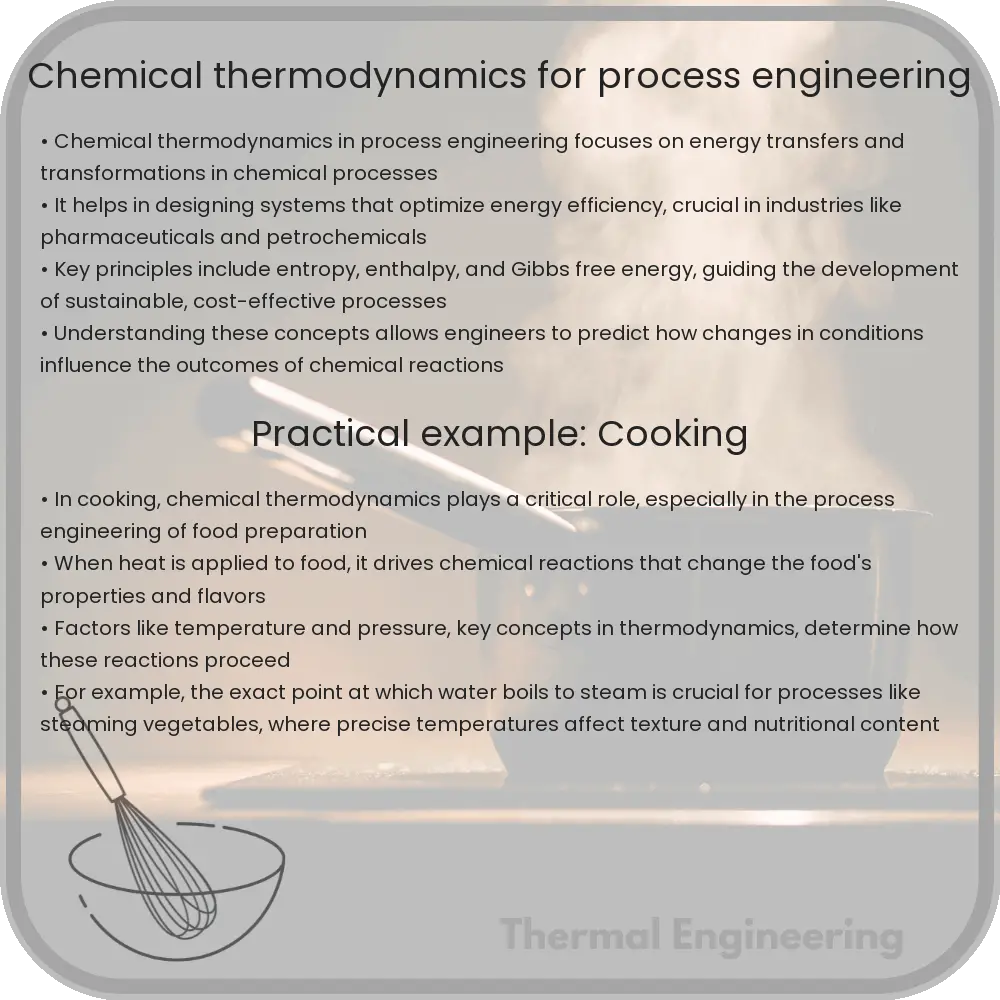Explore the fundamental role of chemical thermodynamics in optimizing and designing chemical processes in process engineering.

Understanding Chemical Thermodynamics in Process Engineering
Chemical thermodynamics is a fundamental branch of chemical engineering that deals with the study of energy exchanges that occur during chemical reactions and phase transitions. This knowledge is crucial for designing and optimizing chemical processes in industries ranging from pharmaceuticals to petrochemicals. The principles of thermodynamics help engineers understand how to convert raw materials into desired products efficiently and sustainably.
Key Concepts in Chemical Thermodynamics
Several key concepts form the foundation of understanding chemical thermodynamics in process engineering:
- First Law of Thermodynamics: Also known as the law of energy conservation, it states that energy cannot be created or destroyed in an isolated system. In engineering terms, this principle is crucial for determining the energy balance around a process. The first law is often expressed as ΔU = Q – W, where ΔU is the change in internal energy, Q is the heat added to the system, and W is the work done by the system.
- Second Law of Thermodynamics: This law introduces the concept of entropy, a measure of the disorder or randomness of a system. It states that the entropy of an isolated system always increases over time. This principle helps engineers determine the feasibility of a process and the maximum efficiency that can be achieved.
- Gibbs Free Energy: A vital tool in chemical thermodynamics, Gibbs free energy (G) combines enthalpy, entropy, and temperature to predict the direction of chemical reactions. A negative ΔG indicates a spontaneous process under constant temperature and pressure.
- Phase Equilibria: Understanding how different phases (solid, liquid, gas) coexist at equilibrium is vital for separation processes like distillation and extraction. The phase behavior can be predicted using equations such as the Clausius-Clapeyron equation for phase transitions.
- Chemical Equilibrium: The state where the concentrations of reactants and products remain constant over time. The equilibrium constant (K) provides a quantitative measure of the composition of the system at equilibrium. It is related to Gibbs free energy by the equation ΔG = -RT ln(K), where R is the gas constant and T is the temperature in Kelvin.
Applications in Process Engineering
Chemical thermodynamics is integral to the design, analysis, and optimization of various chemical processes. Some common applications include:
- Energy Efficiency: By analyzing thermodynamic cycles such as the Heat Engine cycle or the Refrigeration cycle, engineers can improve the efficiency of power plants and refrigeration systems.
- Reaction Engineering: Thermodynamics allows for the design of reactors where optimal conditions for desired reactions are maintained. This includes manipulating temperature, pressure, and concentration to maximize yield and minimize energy consumption.
- Environmental Engineering: Thermodynamics helps in the design of processes that minimize energy consumption and waste production, contributing to more environmentally friendly manufacturing processes.
- Material Synthesis: It aids in predicting and optimizing the conditions under which new materials and compounds can be synthesized.
Challenges and Future Directions
Despite its extensive applications, there are challenges in chemical thermodynamics that continue to drive research and innovation. These include the development of more accurate predictive models for complex mixtures, enhancing the integration of thermodynamics with molecular chemistry for nanoscale processes, and improving the scalability of thermodynamic models in industrial applications.
As process engineering evolves, the role of chemical thermodynamics will expand, especially with advancements in computational methods and techniques. Continued research and development in this field are essential for creating more efficient, cost-effective, and environmentally sustainable processes.
Understanding the basics of chemical thermodynamics can profoundly impact the development and improvement of industrial processes. By mastering these principles, process engineers can ensure more efficient, innovative, and sustainable industrial practices, ensuring their operations are not only profitable but also responsible.